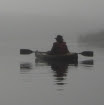Discovered by being in a hurry:
A scoop of baked butternut squash, drizzled with eggnog, tastes like pumpkin pie.
how can we all be free?
2 days ago
The gist of things here in my hometown, set within the arcs of things in the wider world, all from my uniquely biased point of view. Feel free to extend the horizons with your comments.

When the ocean surface warms, it essentially becomes “lighter” than the cold, dense water below, which is loaded with nutrients. This process effectively separates phytoplankton in the surface layer - which need light for photosynthesis - from the nutrients below them, which they also need for growth.Well, so what? Aren't trees more important than these phytoplankton that we can't even see with the naked eye? Back to the news release:
Despite their microscopic size, ocean phytoplankton are responsible for about half of the photosynthesis on Earth, a process that removes carbon dioxide from the atmosphere and converts it into organic carbon to fuel nearly every ocean ecosystem.Ouch.
 It's bigger than last year (in March!), that's for sure. I'd say about four times bigger. I can't get a perfect comparative photo, because I built it closer to the chokecherry behind it this year, to keep the melt water off the driveway and out of the porch.
It's bigger than last year (in March!), that's for sure. I'd say about four times bigger. I can't get a perfect comparative photo, because I built it closer to the chokecherry behind it this year, to keep the melt water off the driveway and out of the porch. Then she came back up to the bend and hunched down, looking at me. I paused and talked to her, suggesting that she should take the chance to run forward and past me, but she just stared. Heartlessly, then, I pushed the snow load on towards her, and she hurried back to the dead end. "It's deep," I warned, but she plunged on.
Then she came back up to the bend and hunched down, looking at me. I paused and talked to her, suggesting that she should take the chance to run forward and past me, but she just stared. Heartlessly, then, I pushed the snow load on towards her, and she hurried back to the dead end. "It's deep," I warned, but she plunged on. Poor kitty. I wish I'd got a video. She looked like she was swimming.
Poor kitty. I wish I'd got a video. She looked like she was swimming.
 This is more like it! Our first lasting snow of the season came last Thursday evening, and the big storm blew in yesterday. Here's the snow pile from a better angle to compare to last year's photo from the beginning of March.
This is more like it! Our first lasting snow of the season came last Thursday evening, and the big storm blew in yesterday. Here's the snow pile from a better angle to compare to last year's photo from the beginning of March.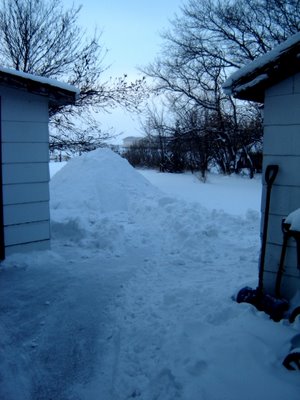 This pile is bigger already. I was out before daylight topping it up with the new snowdrifts from overnight, to keep Garth from shovelling and re-injuring his elbow. It's been puffed up and glowing red a couple of times in the last few days, but it improves with rest and a castor oil pack. He thinks he hurt it in a curling game, sweeping.
This pile is bigger already. I was out before daylight topping it up with the new snowdrifts from overnight, to keep Garth from shovelling and re-injuring his elbow. It's been puffed up and glowing red a couple of times in the last few days, but it improves with rest and a castor oil pack. He thinks he hurt it in a curling game, sweeping.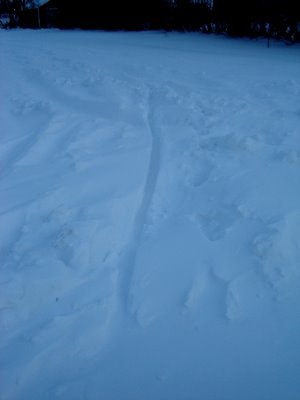
If you have read any of Diarmuid's books, you will know that they are dense, crammed with information and new thinking. Diarmuid, in person, is engaging, easy to follow and always intensely interested in engaging in discussion.One more thing: I just took a look at Diarmuid's website (see the link from his name above) and came across a list of books that he has found inspiring. More reading! I have a moment of shrinking dismay, like the feeling I used to get when I stood among the stacks in the university library, but oh, there are some tantalizing titles there.
I have noticed that some environmentalists are very selective in their concerns.I know of one that gets on a plane,flys halfway around the world using more fuel than my 2000 acre farm does in at least three years,to educate people that could get the same information from a book or the internet.He then comes home and says how well THEY treat their environment.I believe that he is a graduate of the CBC-David Suzuki school "of the other guy make changes" school of environmentalism.Sorry, spike, you missed. Just because I'm married to him doesn't mean I agree with him. And just because he's married to me doesn't mean he's an environmentalist.
Despite the intuitive sense that electric bikes would require more resources than regular bikes, life-cycle analysis shows that they actually consume 2-4 times less primary energy than human riders eating a conventional diet. This conclusion is largely due to the considerable amount of transportation and processing energy that is associated with our western food system.When the analysis considered a cyclist eating local food, and electricity coming from hydro-power, the electric bike and the human-powered bike were about on par.
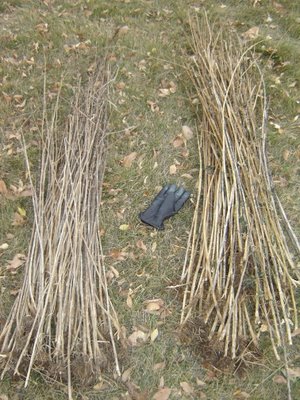
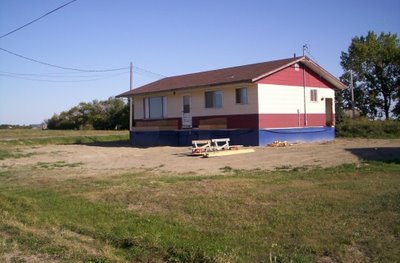
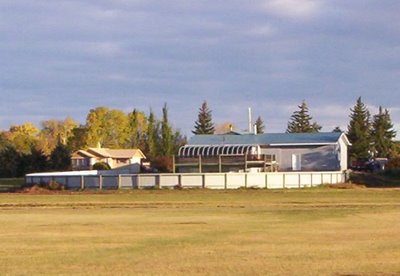
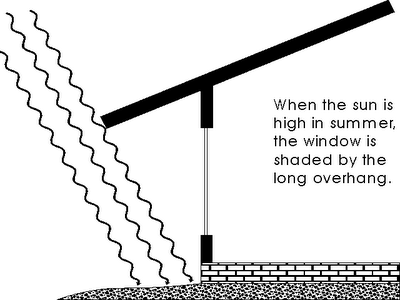
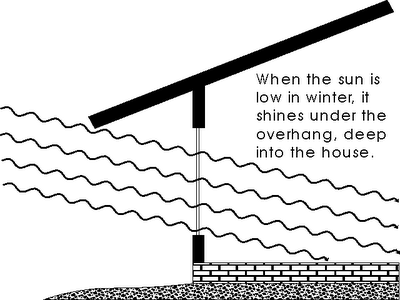
Because our atmosphere bends sunlight about a half-degree (60 km) into the area of the Earth that would otherwise be dark, the sunlit part of the Earth is slightly more than half of the entire surface (there is actually more than 12 hours of daylight at the equinoxes).
